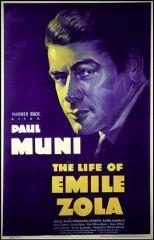Fictionalized account of the life of famed French author Emile Zola. As portrayed in the film, he was a penniless writer sharing an apartment in Paris with painter Paul Cezanne when he finally wrote a best-seller, Nana. He has always had difficulty holding onto a job as he is quite outspoken, being warned on several occasions by the public prosecutor that he risks charges if he does not temper his writings. The bulk of the film deals with his involvement in the case of Captain Alfred Dreyfus who was falsely convicted of giving secret military information to the Germans and sentenced to life imprisonment on Devils Island. Antisemitism played an important role in the real-life case but is hardly mentioned in the film. Even after the military found definitive evidence that Dreyfus was innocent, the army decided to cover it up rather than face the scandal of having arbitrarily convicted the wrong man. Zola's famous letter, J'Accuse (I Accuse), led to his own trial for libel where he was ...
Written by
garykmcd
Plot Synopsis:
-------------------
As a writer who, like Charles Dickens, saw no part of society unworthy of his attention and scrutiny, Emile Zola (Paul Muni) gradually rises, through his novels, as a moralist who semes to understand, empathize with, and appreciate people in all stations in life. His fame and credibility as a champion of the people give him the courage to intervene in the notorious Dreyfus affair, in which Alfred Dreyfus, a Jewish officer in the French army, is, despite the lack of evidence against him, found guilty of the treasonous acts of another Army officer and exiled to Devil's Island. Within a year of Dreyfus' arrest, it becomes clear to several in the French army that Dreyfus was innocent, but they resolve to sweep the mistake under the rug rather than rectify it.
When it later becomes evident to Zola that the Dreyfus affair is a coverup, the resolution of which might impugn the honor of the French army, he realizes that he won't have an easy time exposing the truth, but he tries. He is incensed when the real perpetrator, Esterhazy, is found innocent in a rigged court martial hearing. Disenchanted, Zola risks his career and fame by writing a letter to the President of France and has it published in a major newspaper. The article, called J'Accuse, is a direct accusation of the French army in covering up the innocence of Dreyfus to protect one of its own, and the result of this unpopular letter is the arrest of Zola on a libel charge. To the army's dismay, the court proceedings against him give Zola an even greater platform from which to publicly expose the weakness of the case against Dreyfus.
In the courtroom, the army has little choice but to try to bully and discredit the popular Zola, and causes him to be shunned by many, even in the country in which he is a revered novelist and moralist. Rather than remaining in France after his conviction, Zola sees it fit to flee to England, his courage and conviction in uncovering the truth unimpaired. The Dreyfus case is ultimately reopened, and Dreyfus is offered a pardon, which he accepts. Dreyfus is set free and promoted in the French army, and Zola can now return to French soil, his actions vindicated by the pardon.
Sadly, Zola dies before the French court fully exonerates Dreyfus, but his valiant fight in the Dreyfus affair only added to his reputation of one of France's greatest men. Zola's courageous and zealous pursuit of the truth in his novels and in his life make him a symbol of morality and integrity for the ages.
0

